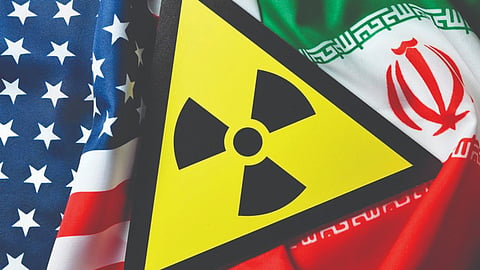

By OLIVER ROLOFS
As we’ve seen in the cases of North Korea, Iran, Cuba, and now Russia, the regimes in question have not been toppled as a result of sanctions, but they have been severely affected in their armed capabilities, forced to choose between economic survival and maintaining their military objectives.
In the United States in particular, the use of sanctions has become increasingly popular as a high-impact, non-kinetic approach to intervention, with their number increasing by over 1000% over the last 22 years. There is a tacit understanding that sanctions may not always achieve their primary goal, but will at least force the sanctioned party into talks, where compromises can be agreed.
Between nuclear powers especially, conflict must be shaped by sanctions and proxies, as direct military action could have devastating consequences. They also have a role to play in preventing nuclear proliferation in the first place. In Iran they have previously helped bring the regime to the negotiating table, and while the JCPOA, commonly known as the Iran nuclear deal, now feels a long way away, the economic challenges in Iran are contributing to the pressures we now see on the streets from a large, increasingly young and disenchanted population.
The threats of sanctions and ultimately political pressure from Washington, for example, were one of the main reasons behind Taiwan abandoning its own pursuit of nuclear weapons in the late 1980s.
Likewise, sanctions were successful in the late 1980s in drawing a red line to Libya’s then ruler Moammar Gadhafi and getting him to turn away from international terrorism. And even Britain backed down in the face of Washington’s sanctions policy against its ally Israel and settled the Suez conflict with Egypt in 1956.
Amid all these examples of — sometimes qualified — successes, it is of course just as easy to point to failures. What becomes clear when examining both is a need to be realistic and clear about objectives. When sanctions have failed to achieve their objective, it has been mainly because the scale of the sanctions was not significant enough or correctly targeted to achieve policy change.
Many of these lessons have clearly been learned in the case of Russia and its war of aggression against Ukraine. The sanctions placed on that country in the past eight months are the most coordinated and comprehensive action of their kind ever recorded. Having recognised that the sanctions applied in 2014 over the occupation of Crimea were insufficient for the task, the US, EU, and UK have worked hard to improve their cooperation with each other, ensuring that Russia’s Achilles’ heels are being targeted.
The real impact will be years in the making, but the sanctions have significantly reduced Russia’s ability to make up for materiel losses, to the point that they are now increasingly relying on early Soviet arms, armour, and munitions.
Other mistakes are still made, especially when we move from state level sanctions to look at individuals. A lack of clear strategy, or limited capacity of sanctions teams sometimes means that such key individuals or entities are missed, or conversely caught up in sanctions arbitrarily. There have been regular reports that the departments in Western countries responsible for identifying who to sanction are severely understaffed and simply lack sufficient data to always make appropriate decisions.
Despite the overall severity of the sanctions against Russia for example, numerous key businesses and leaders in Russia remain untouched. This includes the arms industry, with reports showing that nearly 50 arms and defense companies have not been included in US or European sanctions.
This article was provided by Deutsche Welle
Visit news.dtnext.in to explore our interactive epaper!
Download the DT Next app for more exciting features!
Click here for iOS
Click here for Android